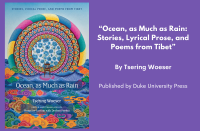
High Peaks Pure Earth continues to translate the unpublished Chinese language manuscript “The Restless Himalayas” by Dolma Kyab, the work for which he was sentenced to ten and a half years in prison in March 2005.
The manuscript is comprised of a preface, 57 chapters, concluding remarks and an afterword. Having previously published the preface, Chapter 1 and Chapter 3, we now jump ahead to Chapter 54 titled “A New Generation of Tibetans”.
The Restless Himalayas
Chapter 54: A New Generation of Tibetans
By Dolma Kyab
A people on the verge of collapse, through the power still coursing through their veins, can always save themselves – like a lion that learns to capture its prey, a wild ox that learns to graze on its own; an eagle that learns to spread its wings and fly high into the sky. These animals are capable of surviving. Indeed, the power embodied within these three special animals exemplify the issue I wish to discuss.
We have witnessed a new generation of Tibetans, flying high like the eagles, living in the mountains like wild oxen, fiercely and stubbornly protecting their homeland.
When a people display such characteristics, they therefore constitute a defined force that will add to the glory of their people’s history. However, some people theorise that a such a group will form only after the opportunity to utilise its fire power has already expired. Others stupidly open their mouths and declare, “This is no good; they’ll kill us all.”
However, figures with the most authority on such matters believe that every 20 years, a given nation or people will experience a wave of passionate radicalism. In particular, these ideological waves value life, love and freedom very highly. They cause dismay among the elderly, women to go crazy, men to become more stable. From beginning to end, these waves represent the most brilliant displays of human reason.
These passionate waves are produced as [a group of people who possess great] power recognise the shortcomings of their current situation but also retain hope for the future. In fact, the current society conflicts are providing even more pressure on us. To put it another way, efforts to extinguish our rationality have conversely resulted in a powerful eruption of reason. Although certain people strive to totally prevent this eruption of reason from happening, their efforts actually increase the probability that said eruption will eradicate the very people who conspire to prevent it. Furthermore, just like a volcano, this eruption of reason will continuous reoccur.
Today, Tibet is experiencing an era of maturation. Tibetans are much more mature and rational than in the past. We see more things through a rationalistic lens. For example, the political regime of a certain country may issue orders such as the following to another people: “The only way to survive is to live a simple life” Orders such as these are certainly effective towards inherently irrational, nonsensical or less stable people. However, such orders will enrage millions of rational people. These orders become fuses, both in a literal and figurative sense, providing the spark that ignites backlash and revolt. Often, such reactions stem from oppression ostensibly aimed at a certain individual of symbolic importance to a nation or a people, or who represents a component of said people’s culture. An order directed at this person would constitute an order to the nation at large. These orders are therefore inherently quite dangerous. For example, the political regime of a certain country may declare that “Lobsang is not permitted to resist any national policy; he is required to comply with slavery.” This person may be an ethnic Tibetan or a non-Tibetan foreigner. However, although this order was outwardly only addressed to him, as I have discussed before, perhaps others may feel that this person is representative of the population as a whole. To give another example, the political regime of a certain country might condemn the Dalai Lama, declaring that “the Dalai Lama is an anti-revolutionary and separatist.” The moment that threat is made, the Dalai Lama acts as a symbol of Tibet, for such an order does not affect a singular person but the whole people. It constitutes a covert threat to all Tibetans, as we can say with great certainty that the Dalai Lama is part of the Tibetan reincarnation system. He is a part of Tibetan culture. This kind of order is no longer one-dimensional; rather, it is a targeted warning for the purpose of threatening all Tibetans to obey the government.
I say this because Tibetans no longer seek to incorrectly label themselves with incorrect ideas. Rather, Tibetans defend our reasoning and more correctly think about our problems. If we dealt with our problems with mistakes, we would be making mistakes on top of mistakes. In other words, if we knowingly accept our enslavement, then I’m afraid the problem would not lie in others – the problem would be us. Otherwise, perhaps it would mean that we lack something within ourselves that should make us rational and passionate. A normal person capable of reasoning and passion would not simply bow his head and accept his enslavement. I want people to remember that if you are inferior to others, then you can be their slave. If you can escape your enslavement, then that proves that you are not inferior compared to others – or that you are not inferior to them at all. I think even goons can understand this logic. It’s not a bad thing; it’s a very healthy mentality. At this point in my argument, some people may refute my views or even attempt to rudely negate my opinions. If so, I have even more reason to declare the following: Their high and mighty words are meant to enslave us. Some people are so affected by these bombastic words, which are meant to enslave them, that they are then willing to convince their fellow countrymen to be enslaved, as well. I believe those people lack rationality and courage – for a tiger is not affected by a small animal’s screams.
We now must confidently call out to all Tibetans. If one Tibetan obtains material happiness, does that necessarily mean that all Tibetans have obtained such happiness? As he lives his indulgent life, does that mean he is truly free? If a Tibetan says that “once you have money, you have everything,” do people really believe him? I think people can see the answers even more clearly than myself, for the people deeply understand that it’s not a slab of fatty meat on their shoulders, but rather it’s a brain capable of critical thinking.
During the windstorms of passion that lie ahead, we shall witness the real Tibetan people. For this is the attitude of Tibetans: We do not hate or reject any group of people. We clearly differentiate the issues of freedom and passion; freedom and ethnic group; freedom and the individual; freedom and reason. We need freedom. We love all peoples. But although we love all peoples, this does not mean that other people may oppress us as they please or deprive us of our freedom. In the future, we will more openly express this to others. For within our love for them is the necessity for us to be equally free. Any people, knowing that we love them, who attempts to oppress us or cleverly control our freedom in any way, is, in effect, pushing our love for them to its limits. However, as soon as they turn their actions around, they will find they have obtained even greater power. Metaphorically speaking, this power will be even stronger than an erupting volcano. Because of this, we hope to love you. We do not require your love, but we must have your respect. Perhaps people are familiar with the way by which liquids are more powerful than solids in the natural world – like how floodwaters can sweep away gigantic rocks. But can rocks turn floodwaters away? Sulphuric acid can burn people and trees; alcohol can send a person’s nervous system into disarray, but can people become more sober by drinking alcohol?
The new generation of Tibetans is drawn to kindness and bravery. We have found what drives us. We have inherited the kindness and bravery of our elders, and we are also influenced by modernisation. Because of this, our hope has progressively turned both into reality and even greater hope.





Follow Us!